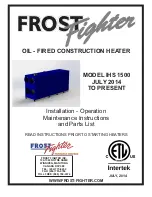
Connections
20
Domestic Water Connections
(Continued)
Always ensure the use of approved type devices. Safety devices include the following components:
Use hemp and pipe dope on all threaded
stainless steel nipples on tank.
H
Isolation valves
H
Drain valve
H
Pressure reducing valve
where required by local jurisdiction
H
Drinking water filter
where required by local jurisdiction
H
Back-flow preventer
Where backflow preventers are
required, a domestic water expansion
tank installation is required in the cold
water inlet piping before the cold
water enters the tank. The back-flow
device must be installed according to
the manufacturer’s installation
instructions. Observe local codes and
regulations.
H
Tempering valve
A tempering valve must be field
installed where storage tank
(domestic hot water temperature)
exceeds local restricted temperatures
or 140°F / 60°C. Check code
requirements.
In situations where a booster pump is
used to maintain DHW pressure,
Viessmann strongly recommends the
installation of an oversized large
expansion tank to ensure longer, less
frequent pump cycles with less severe
pressure gradients. If possible, use
flexible piping before and after booster
pump to isolate system piping from
vibration and shocks.
H
Temperature and pressure
relief valve
A temperature and pressure relief
valve (T&P relief valve) is supplied
with the tank. The heating contractor
must install the valve on each tank in
a method meeting code requirements.
If local codes require a different relief
valve, substitute the manufacturer’s
supplied valve. The tank is approved
for 100 psig where a CRN is required.
Maximum operating pressure is 150
psig.
The T&P relief valve supplied with the
tank is manufactured by Watts
Industries (Model 40XL-8) set to 100
psi for Canadian installations and set
to 150 psi for US installations (where
applicable). The valve is ASME
pressure steam rated for 998 MBH
and CSA temperature steam rated for
200 MBH. It is tested under ANSI
Z21.22 code for Relief Valves and
Automatic Gas Shut-off Devices for
Hot Water Supply Systems. The relief
temperature is set at 210°F / 99°C.
The valve has a male threaded inlet
and female threaded outlet, both ¾”
sizes.
For steam applications, a field
supplied 1” T&P valve must be
utilized.
Proper installation of the T&P valve
shall include all of the following:
- The T&P valve shall be installed in the
pipe connection point marked TPV in
the tank instruction manual.
- The discharge line from the T&P valve
shall be ¾” / 1.9 cm
∅
and run to a
safe place of discharge approximately
1 ft / 30 cm above the floor, close to
a floor drain.
- The discharge line must be as short
as possible and pitch downward from
the T&P valve and terminate plain.
- Do
not
route discharge line to the
outdoors.
- Do
not
install any type of valve or an
obstruction of any kind between the
tank and the T&P valve, or between
the T&P valve and the discharge line
outlet.
The valve test lever must be operated
at least once per year by the owner to
ensure that waterways are clear. A
licensed professional heating
contractor shall reinspect the T&P
valve at least once every three years.
Failure to inspect can result in unsafe
temperature or pressure build-up,
which can result in death, serious
injury or substantial product/property
damage.
5167
535
v1
.2
IMPORTANT
IMPORTANT
Since the heat exchanger coil allows
for high MBH input (see tank flow
charts), it is necessary at each job
site to confirm that the appropriate
and correct size T&P valve is used
and installed.
WARNING
The discharge line for the T&P valve
must be oriented to prevent scalding
of attendants.
WARNING





































